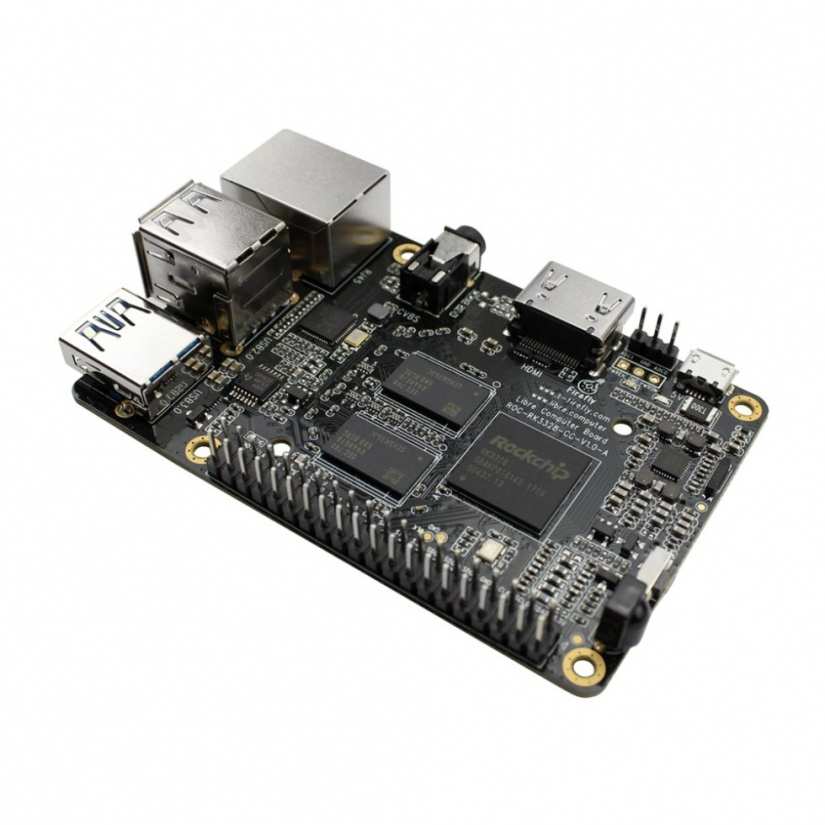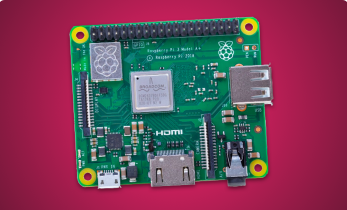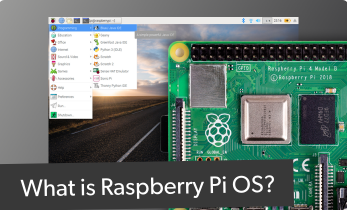Libre Computer ROC-RK3328-CC vs Raspberry Pi 3
The Raspberry Pi isn't the only single-board computer (SBC) on the market. Nor is the Raspberry Pi 3 the solitary Raspberry Pi board you can buy. However, the Pi 3 remains the most popular maker board you can buy, a title it arguably deserves on account of its superb hardware and software support. But several development boards rival the Pi, including the Libre Computer ROC-RK3328-CC. Check out this comparison of the Raspberry Pi 3 vs. Libre Computer ROC-RK3328-CC!
What is the Raspberry Pi 3?
From the Raspberry Pi foundation comes the Raspberry Pi 3 and Raspberry Pi 3 B+. These utilitarian boards serve as the foundation of any project, from a basic Linux PC or retro gaming console to a smart home hub. You'll even find Raspberry Pi projects for kids. There's the top-of-the-line Raspberry Pi 3 B+ and the younger sibling, the Raspberry Pi 3. The B+ rocks a quad-core 64-bit CPU with ARM Cortex A53 architecture. The Raspberry Pi 3 B+, however, amps up the CPU from 1.2GHz to 1.4GHz. Moreover, the Raspberry Pi 3 B+ adds Power over Ethernet (PoE) support for enhanced networking.
Raspberry Pi 3 B+ specs:
- Broadcom BCM2837B0, Cortex-A53 (ARMv8) 64-bit SoC @ 1.4GHz
- 1GB RAM
- 802.11 b/g/n/ac Wi-Fi
- Bluetooth 4.2/BLE
- Extended 40-pin GPIO header
- HDMI
- 4 x USB 2.0 port
- Power over Ethernet (PoE) support
- CSI connector
- DSI connector
- 4-pole stereo output and composite video port
- microSD card slot
- 5V micro USB power slot
What is the Libre Computer ROC-Rk3328-CC?

The Libre Computer ROC-RK3328-CC hails from manufacturer Libre Computer. Its ROC-RK3328-CC board, nicknamed the Renegade, maintains a similar form factor to the Raspberry Pi 3. Whereas the Pi utilizes a Broadcom SoC, the Renegade opts for a Rockchip Rk3328 SoC. Packing a whopping 4GB of RAM, HDMI 2.0 with HDR support, and USB 3.0, it's a solid board with a respectable performance punch.
Libre Computer ROC-RK3328-CC Renegade specs:
- Rockchip RK3328 SoC, 4 ARM Cortex-A53 1.4GHz CPU
- Mali 450 GPU with OpenGL ES 1.1/2.0 and OpenVG 1.1 support
- 4GB DDR4
- Gigabit Ethernet
- microSD card slot
- 40-pin GIPO header
- HDMI with 4K HDR support
Raspberry Pi vs Libre Computer Renegade Hardware Options
With its many variants, the Raspberry Pi offers the greatest choice. From the $5 USD Raspberry Pi Zero all the way up through the maxed out Raspberry Pi 3 B+, there's a Raspberry Pi board for every project and budget. Of these, only the Raspberry Pi 3, Pi 3 Model B+, and partially the Raspberry Pi 3 Model A+ compete with the ROC-RK3328-CC. The Libre Computer comes in three variants. There's a 1 GB version, 2GB tier, and a 4GB iteration. Often, single-board computers arrive in a singular configuration. With its three options, the Libre Computer Renegade provides ample choice for the end-user. When comparing just the Raspberry Pi 3 and the Libre Computer Renegade, each boast three versions.
Winner: Tie
ROC-RK3328-CC vs Raspberry Pi 3: Software Support
Software support remains key to a successful and enjoyable experience with a maker board. Libre Computer Board ROC-RK3328-CC Renegade OSes include a Libre Computer Renegade Ubuntu image, Android for the ROC-RK3328-CC, OpenMediaVault, Android, Station OS, Armbian, and Debian. But while the Libre Computer runs a smattering of OSes, Raspberry Pi 3 operating system options far outweigh the Libre Computer Renegade.
There's Raspbian, multiple Ubuntu flavors, Debian, RetroPie, Lakka, Recalbox, Android images, Chrome OS releases for the Pi, Manjaro Linux, Kali Linux, and more. You'll find specialized Linux distros for creating a Kodi media centre with a Raspberry Pi, or a Raspberry Pi media server. Ultimately, the Raspberry Pi emerges with arguably the best software, and hardware, support.
Winner: Raspberry Pi 3
Libre Computer Board Renegade vs Raspberry Pi: Hardware Support
Similarly, hardware support dictates the SBC experience. Since the Libre Computer Renegade comes in a similar form factor to the Raspberry Pi 3, there are tons of Libre Computer ROC-Rk3328-CC case options. The only difference is the Libre Computer features three USB ports to the Raspberry Pi 3's four USB hosts. Still, that doesn't hamper use. I suggest the LoveRPi Active Cooling Media Center case, though any should be fine.
Yet, the Raspberry Pi features support for a bevy of add ons such as a Power over Ethernet (PoE) hat, Picade X HAT, and a slew of sensors, touchscreens, and more. With its 40-pin GPIO header, the Libre Computer Board Renegade maintains compatibility with a number of devices for SPI, UART, and GPIO goodies. But, once again, the Raspberry Pi 3 comes out on top.
Winner: Raspberry Pi
Raspberry Pi 3 Connectivity vs Libre Computer Renegade Connectivity
Both boards rock Gigabit Ethernet, a pleasant inclusion. Unfortunately, the Libre Computer Renegade lacks Wi-Fi and Bluetooth. Both come standard on the Pi. Likewise, the Pi boasts Power over Ethernet capabilities which the Libre Computer Renegade lacks.
Winner: Raspberry Pi 3
Processing Power: Raspberry Pi 3-Libre Computer Renegade Comparison
The Raspberry Pi 3 and Raspberry Pi 3 B+ offer similar performance. Essentially, the Pi 3 B+ benchmarks about the same as an overclocked Pi 3. It's processing power where the Libre Computer Renegade handily trounces the Pi. Its Rockchip SoC and up to 4GB of RAM provide a speedy desktop experience. Multi-tasking on the Libre Computer is a breeze. Moreover, its 4K HDR video output make the Libre Computer ROC-RK3328-CC a fantastic multimedia board.
Winner: Libre Computer Renegade
Raspberry Pi or Libre Computer Renegade: Community
The Raspberry Pi handily bests virtually every maker board on the market when it comes to community. Whether it's official Raspberry Pi Foundation support, community forums, or articles on various maker websites, there's a veritable treasure trove of Raspberry Pi community support. Libre Computer Renegade tutorials aren't as common, though it's certainly a budding community.
Winner: Raspberry Pi 3
Libre Computer Board ROC-RK3328-CC vs Raspberry Pi 3: Final Thoughts
While on paper the ROC-RK3328-CC Renegade bests the Raspberry Pi 3, the Raspberry Pi escapes defeat. With better connectivity, a vast community, and unrivaled software support, the Raspberry Pi 3 edges out the Libre Computer Renegade. Nevertheless, the ROC-RK3328-CC board is no slouch. Its beefy processing power and 4GB of RAM make it a capable board, especially for desktop use. The main element holding back the Libre Computer is lack of community support and software. A few ROC-RK3328-CC OSes are, tragically, a bit buggy. Notably, Station OS, a promising HTPC and retro gaming Android operating system, is near impossible to navigate.
Still, I'd highly encourage Libre Computer Renegade adoption. Though the Raspberry Pi 3 wins the match up, the ROC-RK3328-CC is a more than competent board which largely holds its own. With 4K output, it's a nifty little multimedia device. Plus, the Libre Computer Renegade functions well for network attached storage (NAS) purposes either with OpenMediaVault or a roll-your-own server build.
Overall winner: Raspberry Pi 3
Which maker boards do you suggest using?















































Leave your feedback...